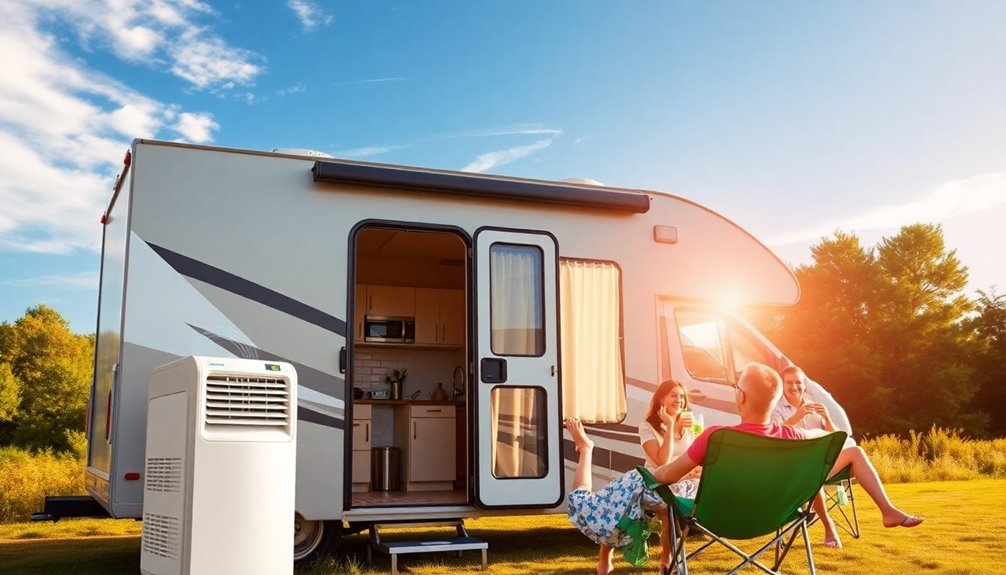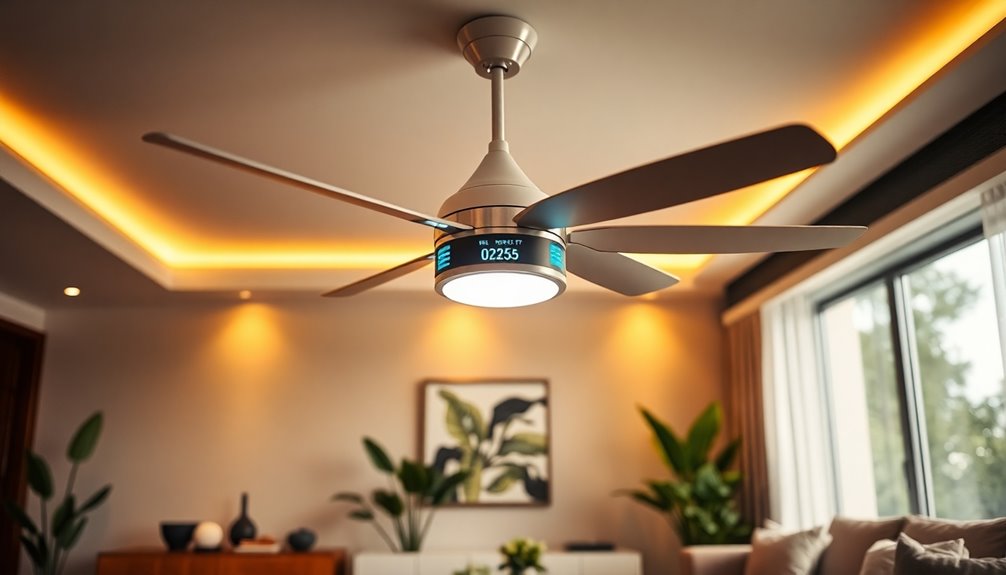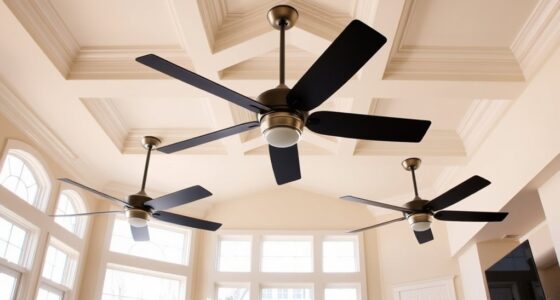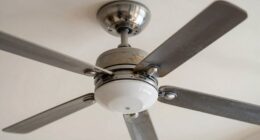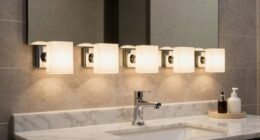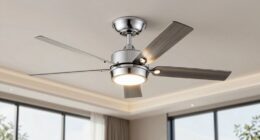If you're looking for the best portable air conditioners for your RV in 2025, I've got you covered. My top picks include the BLACK+DECKER 10,000 BTU for its quick cooling and user-friendly features, and the Dreo 12,000 BTU, which operates quietly without needing drainage. I also love the Whynter NEX Inverter for its energy efficiency and smart tech capabilities. Depending on your space, options like the SereneLife and compact USB models offer versatility. Keeping comfortable on the road is easy with the right AC unit. Stick around to explore which models are perfect for your travels and specific needs! When planning ahead, it’s worth considering future innovations, as the best portable air conditioners 2025 could introduce even more efficient and compact designs tailored for RV living. With advancements in smart technology and eco-friendly cooling, newer models are likely to build on the success of units like the BLACK+DECKER and Whynter NEX Inverter. Staying cool and comfortable on the road has never been so accessible, making it easier than ever to upgrade your RV experience. As technology continues to evolve, the best portable air conditioners 2025 are expected to redefine convenience and functionality, offering advanced features like app-controlled settings and improved battery efficiency for off-grid adventures. Investing in a quality portable AC unit now not only enhances your current travels but also ensures you’re prepared to embrace future upgrades seamlessly. Whether you prioritize energy savings, noise reduction, or compact designs, the upcoming innovations promise to enhance your RV lifestyle even further.
Key Takeaways
- Look for lightweight portable air conditioners, ideally under 30 lbs, for easy transport in RVs.
- Choose models with compact designs, preferably under 24 inches tall, to fit in RV spaces.
- Consider cooling capacities of 5,100 BTU or higher for effective temperature control in various RV sizes.
- Opt for units with multiple functionalities like cooling, heating, and dehumidification for versatile climate control.
- Ensure models have user-friendly features such as remote control and quick setup for convenient operation on the road.
BLACK+DECKER 10,000 BTU Portable Air Conditioner with Remote Control
If you're looking for an efficient way to keep your RV cool during hot summer trips, the BLACK+DECKER 10,000 BTU Portable Air Conditioner with Remote Control is an excellent choice. This powerful unit effectively cools spaces up to 450 sq. ft., making it perfect for RVs. Weighing just 47.3 lbs, it's easy to move thanks to its casters and side handles. The 3-in-1 functionality—air conditioning, dehumidifying, and fan—ensures a comfortable environment no matter the weather. I appreciate its rapid cooling capability, especially in sweltering heat. Plus, the user-friendly remote control allows me to adjust settings from anywhere in the RV. Just remember to maintain it regularly by cleaning filters and managing water drainage for peak performance.
Best For: Those seeking an efficient and portable cooling solution for RVs or small to medium-sized rooms.
Pros:
- 3-in-1 functionality offers air conditioning, dehumidifying, and fan modes for versatile use.
- Rapid cooling performance effectively maintains comfortable temperatures even in high heat.
- User-friendly remote control allows for easy adjustments from a distance.
Cons:
- Water drainage issues may require elevation for proper management and can be inconvenient.
- Installation kit may have fit issues with standard windows, complicating setup.
- Remote control lacks illumination, making it difficult to read in low-light conditions.
SereneLife Portable Air Conditioner 10,000 BTU
The SereneLife Portable Air Conditioner, with its impressive 10,000 BTU cooling capacity, is an ideal choice for RV enthusiasts seeking a powerful yet portable solution for beating the heat. It cools spaces up to 450 sq ft effectively and offers four modes: cooling, heating, dehumidification, and fan. I love the built-in dehumidifier, which helps manage humidity levels on those muggy days. Its lightweight design and rolling wheels make it easy to move around, and installation is a breeze with the included window mount kit. While the noise level can be a tad bothersome for light sleepers, the timer function adds convenience. Overall, it's a solid choice, though energy efficiency could be better if you're planning to run it on solar power.
Best For: Those seeking a portable air conditioning solution for medium-sized spaces, such as RVs or small rooms, who value versatility and ease of use.
Pros:
- 4-in-1 functionality offers cooling, heating, dehumidification, and fan modes for versatile climate control.
- Lightweight and portable design with rolling wheels ensures easy relocation as needed.
- User-friendly remote control and timer function enhance convenience and energy efficiency.
Cons:
- Higher power consumption compared to some window units, which may limit use with solar generators.
- Moderate noise levels can be disruptive for light sleepers during operation.
- Installation challenges with the window mount kit may require additional adjustments or alternative solutions.
Dreo Portable Air Conditioner (12,000 BTU)
For RV enthusiasts who crave comfort during their travels, the Dreo Portable Air Conditioner (12,000 BTU) stands out with its impressive cooling capacity and smart features. This unit operates without drainage when humidity is below 85%, making it hassle-free. With a noise isolation system that keeps sound levels at just 46dB, it's perfect for a peaceful night's sleep. The 3-in-1 functionality allows for cooling, dehumidifying, and fan use, while the temperature range of 65 to 86 degrees caters to various preferences. Installing it is a breeze, thanks to the universal window kits. Plus, the Dreo App and smart home compatibility give me full control over my comfort. It's a compact, efficient solution that truly enhances my RV experience.
Best For: RV enthusiasts seeking a compact and efficient cooling solution during their travels.
Pros:
- Noise isolation system maintains quiet operation at just 46dB, ideal for restful sleep.
- 3-in-1 functionality provides cooling, dehumidifying, and fan options for versatile comfort.
- Smart home compatibility allows control through the Dreo App, Amazon Alexa, and Google Home.
Cons:
- Limited cooling effectiveness in extremely high humidity conditions above 85%.
- Installation may require additional adjustments for non-standard window sizes.
- The compact design may limit cooling coverage in larger open spaces.
Whynter NEX Inverter Portable Air Conditioner (ARC-1230WN)
Looking for a portable air conditioner that can efficiently cool your RV without sacrificing energy consumption? The Whynter NEX Inverter Portable Air Conditioner (ARC-1230WN) is a fantastic choice. It cools spaces up to 600 sq ft while using 40% less energy, thanks to its advanced inverter technology. With a built-in dehumidifier that handles 87 pints a day, it also offers four modes—auto, cool, dehumidify, and fan. I love the smart control feature; using the NetHome Plus app, I can adjust settings remotely and even connect it to Alexa or Google Home. Plus, its easy installation and quiet operation make it perfect for traveling. Overall, it's a powerful, efficient solution for staying cool on the road.
Best For: Those seeking a high-efficiency portable air conditioner that combines powerful cooling with smart technology for enhanced convenience.
Pros:
- Energy Efficient: Utilizes inverter technology for 40% less energy consumption while providing powerful cooling.
- Smart Control: Features WiFi connectivity and compatibility with Alexa and Google Home for remote operation and scheduling.
- Quiet Operation: Runs quietly even on high fan speed, making it suitable for various activities without disruption.
Cons:
- Higher Price Point: May be considered expensive compared to other portable air conditioning units.
- Size Limitations: Best suited for spaces up to 600 sq ft, which may not accommodate larger areas.
- Installation Requirements: While installation is user-friendly, it still requires setup with a window installation kit.
Portable Air Conditioner (5100BTU)
Are you searching for a compact cooling solution that won't weigh you down during your next RV adventure? The Portable Air Conditioner with 5100 BTUs is an excellent choice for staying cool. Weighing just 30.9 lbs and measuring 19.68×10.82×12 inches, it's easy to transport thanks to its ergonomic carrying handle. This unit effectively cools spaces up to 160 square feet, with a temperature range of 61°F to 90°F. It features multiple modes, including Cool, Dry, and Sleep, along with a Bluetooth remote for easy control. While user feedback varies on cooling performance and noise levels, its lightweight design and dehumidifying functions make it a practical option for camping, RVs, and outdoor gatherings.
Best For: Those seeking a lightweight and portable air conditioning solution for camping, RV trips, or small outdoor spaces.
Pros:
- Compact and lightweight design makes it easy to transport and set up in various environments.
- Multiple cooling modes and adjustable fan speeds cater to different comfort needs.
- Bluetooth remote control allows for convenient operation from a distance.
Cons:
- Mixed user reviews regarding cooling performance and effectiveness in larger spaces.
- Noise levels may be disruptive for some users, especially in non-sleep modes.
- Operational guidelines require waiting periods when changing modes, which may be inconvenient.
Portable Air Conditioner, 2416BTU Compact & Lightweight Outdoor AC Unit
The 2416BTU Compact & Lightweight Outdoor AC Unit stands out as the perfect choice for RV enthusiasts seeking a portable cooling solution. With a cooling capacity of 2416 BTU, it's designed for areas up to 55 sq. ft., making it ideal for individual use. Weighing only 14.7 lbs, its ergonomic handle allows for easy transport. I appreciate the hassle-free installation—everything I need comes included. It cools a space in about 15 seconds, and I can adjust the temperature between 61°F to 88°F with three wind speed options. However, while it excels in smaller spaces, some users have noted weak airflow and insufficient cooling in extreme heat. Overall, it's a great companion for camping and outdoor adventures.
Best For: This portable air conditioner is best for individuals seeking a compact and efficient cooling solution for small spaces like RVs and camping setups.
Pros:
- Lightweight and portable design makes it easy to transport and set up wherever needed.
- Quick cooling capability allows it to cool a space in approximately 15 seconds.
- User-friendly features include a remote control and touch screen display for easy operation.
Cons:
- Limited cooling effectiveness reported in extreme heat conditions, particularly in larger areas.
- Weak airflow can affect overall cooling performance in some user experiences.
- Mixed feedback on remote functionality, with some users experiencing issues.
Portable Air Conditioner, 5100BTU Mini AC for Camping and RV
For RV enthusiasts and campers seeking a reliable cooling solution, the Portable Air Conditioner with 5100 BTUs stands out as an ideal choice. This compact unit, measuring just 19.68×10.82×12 inches and weighing 30.9 lbs, efficiently cools spaces up to 160 square feet, making it perfect for RVs and tents. It operates within a cooling range of 61°F to 90°F, and its 24-hour timer and sleep mode guarantee convenience and quietness at night. I love that it doubles as a dehumidifier, which is essential during humid outings. The Bluetooth remote control allows me to adjust settings from up to 32 feet away. However, I did encounter some issues with the installation manual, so keep that in mind!
Best For: RV enthusiasts and campers looking for a compact and efficient cooling solution in small spaces.
Pros:
- Compact and lightweight design makes it easy to transport and fit in various environments.
- Multiple modes and Bluetooth remote control enhance user convenience and comfort.
- Quiet operation ensures a peaceful atmosphere during nighttime use.
Cons:
- Mixed reviews on cooling effectiveness in larger or enclosed areas.
- Installation manual lacks clarity, leading to potential confusion during setup.
- Concerns about water drainage and potential damage if not monitored properly.
EF ECOFLOW Wave 2 Portable Air Conditioner
If you're seeking a reliable cooling solution for your RV or outdoor adventures, the EF ECOFLOW Wave 2 Portable Air Conditioner stands out with its impressive 5,100 BTU cooling capacity. It cools spaces quickly, dropping temperatures by 18°F in just five minutes. Plus, it doubles as a heater, raising temperatures by 18°F when needed. What I love most is its versatility; I can charge it four different ways—AC, solar, car, or power stations—thanks to its swappable battery. It operates quietly at 44 dB, making it perfect for peaceful nights. While it's a bit heavier at 32 lbs, the performance and convenience make it worth it, especially compared to competitors. You won't regret having this in your gear.
Best For: Those seeking a versatile and portable cooling and heating solution for outdoor activities, RVs, or small home spaces.
Pros:
- Efficient cooling and heating performance with rapid temperature adjustments.
- Multiple charging options, including solar, for off-grid use.
- Quiet operation at 44 dB, ideal for nighttime use.
Cons:
- Heavier design at 32 lbs may be cumbersome for some users.
- Higher condensate production may require manual management in high humidity.
- Slower heating performance compared to dedicated heaters, not suitable for freezing climates.
Portable Air Conditioner for Camping
Camping enthusiasts looking for a reliable way to beat the heat will find portable air conditioners to be an excellent solution. I've used a model that measures just 21x14x12 inches, making it easy to transport. With a cooling capacity of 5200 BTUs, it effectively cools spaces up to 60 square feet—perfect for tents or small RVs. Plus, it operates quietly at ≤50dB(A), allowing for peaceful nights. I appreciate its versatility; I can use it on a 12V DC or 110V AC power source, and it even includes a DC-to-AC inverter for power banks. It's multifunctional, providing cooling, fan, and heating modes for year-round comfort. For anyone camping, this portable air conditioner is a game-changer!
Best For: Camping enthusiasts and outdoor adventurers seeking a portable and efficient cooling solution for small spaces.
Pros:
- Low noise level (≤50dB(A)) ensures a peaceful environment for relaxation and sleep.
- Versatile power options allow for use with both 12V DC and 110V AC sources, enhancing portability.
- Multifunctional design includes cooling, fan, and heating modes for year-round use.
Cons:
- Limited cooling capacity may not suffice for larger spaces beyond 60 square feet.
- Requires a power source, which may be a limitation in remote areas without access to electricity.
- Initial setup may require additional accessories (like a DC-to-AC inverter) for certain power bank connections.
Portable Air Conditioner for Car and RV
Designed for those who love the great outdoors but refuse to compromise on comfort, this portable air conditioner is perfect for RV enthusiasts. Weighing just 13kg and measuring 50cm x 34cm x 46cm, it's compact enough to fit comfortably in your RV. With a cooling power of 650W and a quiet operation range of 36-49 dB, you'll enjoy a peaceful environment while staying cool. I appreciate its energy-efficient features, like the eco-friendly R290 refrigerant and 280W power consumption in energy-saving mode. Plus, the smart control options—voice, app, remote, or buttons—make it incredibly user-friendly. With built-in safety features and a 30-day return policy, I feel confident investing in this essential RV companion.
Best For: RV enthusiasts and campers seeking a portable, efficient cooling solution for outdoor adventures.
Pros:
- Compact and lightweight design makes it easy to transport and install in various settings.
- Multiple control options (voice, app, remote, buttons) enhance user convenience and accessibility.
- Energy-efficient operation with eco-friendly refrigerant helps reduce environmental impact and save on energy costs.
Cons:
- Cooling capacity may be limited for larger RVs or extreme heat conditions.
- Noise level can be noticeable at higher settings, potentially disturbing quiet environments.
- Initial investment cost may be higher compared to traditional cooling methods.
EF ECOFLOW Wave 2 Portable Air Conditioner
The EF ECOFLOW Wave 2 Portable Air Conditioner is an excellent choice for RV enthusiasts who prioritize flexible cooling and heating options. With its powerful cooling mode dropping temperatures by 18℉ in just five minutes and heating mode doing the same, it's a versatile companion. I appreciate the four charging options—AC, solar, car, and power stations—making it easy to keep cool or warm wherever I am. Plus, it's surprisingly quiet at 44 dB, perfect for nighttime use. However, I've noticed mixed reviews about its runtime, especially with the add-on battery. While it can run for 7-14 hours, some users report only four hours on a full charge, especially in colder conditions. Overall, it's a solid choice for specific needs.
Best For: The EF ECOFLOW Wave 2 Portable Air Conditioner is best for RV enthusiasts and campers seeking versatile and portable temperature control in various environments.
Pros:
- Powerful cooling and heating capabilities with the ability to drop or raise temperatures by 18℉ in just five minutes.
- Multiple charging options including AC, solar, car, and power stations, providing flexibility for usage anywhere.
- Quiet operation at 44 dB, making it suitable for nighttime use without disturbing sleep.
Cons:
- Inconsistent runtime experiences reported by users, with some only achieving 4 hours on a full charge in certain conditions.
- Inefficiencies with solar charging, leading to concerns about the battery's performance and longevity.
- Limited effectiveness in colder weather, particularly below 40℉, requiring additional heating sources for comfort.
14,000 BTU Portable Air Conditioner (Cools Up to 700 Sq.Ft)
If you're looking for a powerful solution to keep your RV cool during those hot summer adventures, the 14,000 BTU portable air conditioner is a fantastic choice. With the ability to cool spaces up to 700 sq. ft., it handles even the hottest days without breaking a sweat. This model operates quietly at 52 dB, making it perfect for restful nights. Plus, it features multiple modes—cooling, dehumidification, and fan—allowing for versatile comfort. The remote control makes adjustments easy from anywhere in the RV. Weighing in at 73.8 pounds, it's still portable thanks to its built-in casters. Installation is a breeze with the included kit, ensuring you're set up quickly and ready to enjoy your travels in comfort.
Best For: Those seeking an efficient and portable cooling solution for large spaces, such as RVs or homes up to 700 sq. ft.
Pros:
- Efficient cooling capacity, making it suitable for hot summer days.
- Quiet operation at 52 dB, ideal for peaceful nights.
- Versatile functions including cooling, dehumidification, and fan modes.
Cons:
- Remote control usability issues reported by some users.
- Blue light display cannot be turned off, which may be distracting.
- Slight noise at higher settings can be bothersome for some.
Waykar 4500BTU Portable Air Conditioner – 3-in-1 AC Unit
Looking for a compact air conditioning solution for your RV or camping adventures? The Waykar 4500BTU Portable Air Conditioner might catch your eye with its 3-in-1 functionality—cooling, dehumidifying, and fan modes. It's designed to cover up to 130 sq. ft., making it suitable for small spaces. However, I've come across mixed reviews that raise some concerns. Many users report it struggles to cool efficiently, sometimes generating more heat than cold air. The controls can be finicky, often requiring the remote for operation. Plus, it drains 100 amp hours in just 4.5 hours, which isn't ideal for off-grid camping. Overall, while it has potential, I'd recommend weighing these issues before making a decision.
Best For: Those seeking a compact air conditioning solution for small spaces like RVs, tents, or camping sites.
Pros:
- User-friendly with remote control and touch controls for easy adjustments.
- High-efficiency compressor provides energy savings.
- Advanced noise reduction technology allows for quiet operation.
Cons:
- Reports of poor cooling efficiency, often generating more heat than cold air.
- High power consumption, draining 100 amp hours in 4.5 hours.
- Common issues with touch controls and condensate leaking.
Portable USB Mini Air Conditioner with 3-Speed
For those who love the great outdoors but can't stand the heat, the Portable USB Mini Air Conditioner with 3-Speed is a game changer. This compact device, standing at just 6.4 inches, fits perfectly in my RV or even on my desk. It functions as a fan, air conditioner, and evaporative humidifier, processing air through a built-in filter to deliver a cool breeze. I appreciate the three adjustable speed modes and the automatic timer settings, which allow me to customize my cooling experience. Plus, it's USB powered, so I can easily connect it to my car charger or power bank. With its low noise operation, I can relax in comfort without disturbing the peace—definitely a must-have for summer adventures!
Best For: Individuals seeking a portable cooling solution for home, office, or outdoor activities during hot weather.
Pros:
- Compact and lightweight design for easy portability.
- USB powered, allowing for versatile charging options.
- Low noise operation, providing a comfortable and quiet environment.
Cons:
- Limited cooling capacity compared to larger air conditioning units.
- Requires regular maintenance of the built-in filter for optimal performance.
- May not effectively cool large spaces or rooms.
Camping Portable Air Conditioner (2000BTU)
Camping enthusiasts seeking a lightweight and efficient cooling solution will find the Camping Portable Air Conditioner (2000BTU) to be the perfect companion for their outdoor adventures. Weighing just 11.5 lbs and measuring 9.5*13.8*9.65 inches, it's easy to transport. With a cooling capacity of 2000 BTU, this unit features six adjustable wind speeds for fast cooling. Its 4-in-1 modes—cooling, ventilation, and dehumidification—ensure comfort in various conditions. The 1.2L water tank lets it run for up to 18 hours in low humidity. I appreciate the remote control and manual operation options, making it user-friendly. Plus, it's versatile enough for camping, picnics, or even in my office. With a one-year warranty, it's a solid investment for summer escapades.
Best For: Camping enthusiasts and outdoor adventurers looking for a lightweight and efficient cooling solution during warm weather.
Pros:
- Lightweight and portable design makes it easy to transport for various outdoor activities.
- Multiple cooling modes provide versatility for different environments and preferences.
- Long battery life in low humidity conditions allows for extended use without frequent refills.
Cons:
- Limited cooling capacity may not be sufficient for extremely hot conditions or larger spaces.
- Performance decreases when used under direct sunlight, limiting its effectiveness.
- Requires water refills for optimal operation, which may be inconvenient during extended trips.
Factors to Consider When Choosing a Portable Air Conditioner for RV

When I choose a portable air conditioner for my RV, I always consider several key factors. Cooling capacity, power source options, and portability play a big role in my decision-making. Plus, I can't overlook noise levels and how easy it is to set up—those details can really make or break my camping experience.
Cooling Capacity Requirements
Choosing the right cooling capacity is vital for maximizing comfort in your RV. When I'm selecting a portable air conditioner, I always check the cooling capacity measured in BTUs. Most units range from 2,000 to 14,000 BTUs, with higher capacities suitable for larger spaces. For my smaller RV, I find that an air conditioner with around 5,000 BTUs does the trick. However, if you have a larger RV or high ceilings, look for units with 10,000 BTUs or more.
It's important to factor in the size of your RV and the climate conditions where you'll be traveling. In hotter regions, I've noticed that higher BTUs are necessary for effective cooling. I also make sure to check the effective coverage area specified by the manufacturer; units designed for rooms up to 450 sq. ft. often fit the bill for many RVs.
Lastly, I always balance cooling capacity with energy efficiency. Higher BTUs typically consume more power, so I prioritize models with energy-saving features to keep my energy consumption in check while staying cool on the road.
Power Source Options
After settling on the right cooling capacity, the next step in selecting a portable air conditioner for my RV is figuring out the power source options. I've found that these units can operate on various power sources, including standard 110V AC, DC from batteries, or even solar setups. This flexibility is a game changer for my travels.
It's essential to check the power consumption of the models I'm considering, which typically ranges from 600 to 1300 watts. I need to verify my RV's power supply can handle the energy requirements of the air conditioner I choose. Some units even come with swappable batteries, allowing me to enjoy cool air without being plugged in, which is perfect for those off-grid camping adventures.
Efficiency is another key factor. While higher BTU ratings indicate better cooling, they can lead to increased power consumption. I've learned that energy-efficient models not only prolong battery life but also reduce the frequency of recharging, making them a more sustainable choice for my RV trips. Overall, considering these options will help me stay cool and comfortable on the road.
Portability and Weight
As I explore portable air conditioners for my RV, portability and weight quickly become vital factors. I've realized that lighter units, ideally around 30 lbs, are much easier to transport and set up in the confined spaces of an RV. A compact design is also important; I prefer models that measure less than 24 inches in height, as they fit comfortably in my limited storage areas.
When looking for the perfect air conditioner, I pay attention to features like built-in wheels or ergonomic handles. These make it simple to move the unit both inside and outside the RV without straining myself. It's important for the overall dimensions of the air conditioner to match the available space in my RV, ensuring that it can be stored easily when not in use.
I find that lightweight units, particularly those under 50 lbs, are often better suited for my needs. They can be lifted and maneuvered effortlessly, allowing me to set up my cooling solution without needing additional assistance. Ultimately, prioritizing portability and weight helps me stay comfortable on the road.
Noise Level Considerations
When I'm considering portable air conditioners for my RV, noise level quickly comes into play. I know that noise levels typically range from 36 dB to 56 dB, and for my peaceful nights, I prefer those on the lower end. Units operating above 50 dB can disrupt my sleep, especially since I'm a light sleeper. That's why I focus on models designed specifically for quiet operation.
Many units come with sleep modes or noise isolation technologies, which can drop the noise level below 50 dB at night. I've found that the fan speed and cooling mode can greatly impact noise levels; higher speeds often mean more noise. So, I pay attention to user experiences and reviews that highlight noise performance. It's fascinating how subjective perceptions of sound can be, and I want to make certain that the unit I choose won't keep me awake.
In my search, I make a point to prioritize models that balance effective cooling with quiet operation. After all, when I'm on the road, I want to stay cool without sacrificing my comfort or peace of mind.
Installation and Setup Ease**
Choosing the right portable air conditioner for my RV hinges on how easy it is to install and set up. I want a model that includes a universal window kit because it simplifies installation across various window types and sizes, whether vertical or horizontal. The final thing I need is a complicated setup when I'm ready to hit the road.
I also look for units with minimal assembly, allowing for a quick plug-and-play operation. I don't want to spend my time wrestling with instructions or needing professional help. Lightweight designs and rolling wheels are a must, too; maneuvering in confined RV spaces can be a challenge, and I appreciate anything that makes that easier.
Clear installation instructions and all necessary accessories included can save me a lot of time. It's frustrating to discover I'm missing parts halfway through. Ultimately, I consider the drainage requirements. Some models need elevation for effective water management, while others work without drainage under specific humidity conditions. By keeping these factors in mind, I can guarantee a smooth and efficient setup for my portable air conditioner.
Frequently Asked Questions
How Much Power Do Portable Air Conditioners Consume in RVS?
I've noticed that portable air conditioners in RVs typically consume between 800 to 1,500 watts, depending on their size and efficiency. When I'm planning my trips, I always consider my RV's power source and battery capacity. It's essential to check the specifications to guarantee I don't overload my system. I've found that understanding power consumption helps me stay comfortable without draining my resources too quickly while on the road.
Can I Use a Portable Air Conditioner While Driving?
I know it might seem risky to use a portable air conditioner while driving, but I've found it's doable with the right setup. Many models can run off your RV's power supply, and they can keep you cool on the road. Just make sure your generator or battery can handle the load. I've done it on long trips, and it's a game-changer for staying comfortable while traveling!
What Maintenance Is Required for Portable Air Conditioners?
When it comes to maintaining my portable air conditioner, I make certain to clean or replace the air filter regularly, usually every month. I also check the drain pan for any clogs and empty it if needed. It's important to clean the coils and guarantee there are no obstructions around the unit. I always give it a thorough wipe down to keep it looking good and running efficiently.
Are Portable Air Conditioners Safe for Pets in RVS?
Have you ever wondered if your furry friend is safe while you're cooling down with a portable air conditioner? I've thought about it too, especially during those hot summer trips. The good news is, most portable AC units are safe for pets, as long as you set them up properly and guarantee good airflow. Just keep an eye on your pet's comfort, and make sure they're not too close to the unit. Safety first!
How Do I Choose the Right Size Air Conditioner for My RV?
Choosing the right size air conditioner for my RV was a bit tricky at first. I measured the square footage of my space and used a BTU calculator to find the right cooling capacity. I also considered factors like insulation and the number of windows. It's essential to get an AC unit that matches my RV's size to guarantee efficient cooling. Trust me, you don't want to overwork or underutilize your AC!
Conclusion
To sum up, finding the right portable air conditioner for your RV can make all the difference in your comfort on the road. Whether you're seeking power, portability, or efficiency, there's a perfect option out there for you. By considering your needs, evaluating features, and comparing models, you can guarantee a cool, relaxing journey ahead. So, pack your bags, hit the road, and enjoy the breezy adventures that await with your new portable AC!
